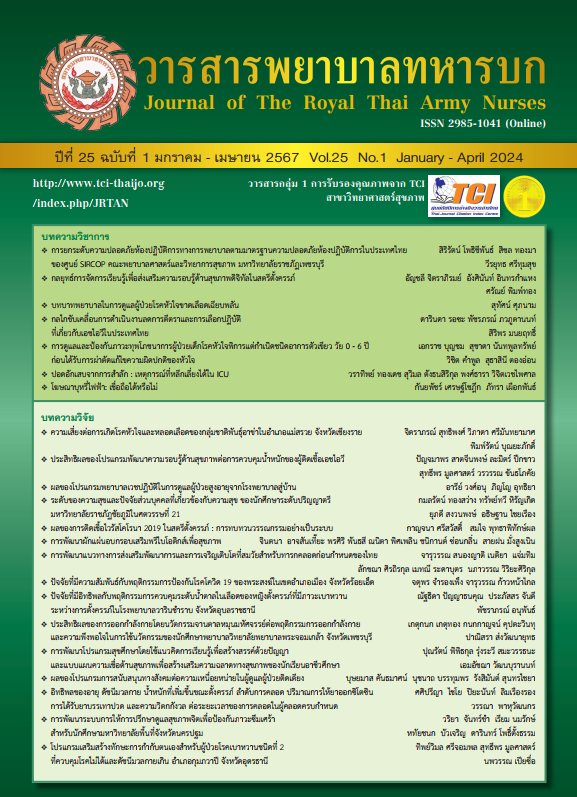The Factors Related to Mental Health Status of Older Adults with Chronic Illness in the Situation of COVID-19, Nakhon Si Thammarat Province
Keywords:
Older adult, Chronic Illness, Mental Health, COVID-19Abstract
This descriptive research aimed to study the mental health status and factors related to the mental health status of older adults with chronic illnesses during the COVID-19 pandemic. The sample comprised 423 older adults with chronic illnesses who received care at subdistrict health-promoting hospitals in Nakhon Si Thammarat Province. The research instruments included 1) a general information questionnaire, 2) a questionnaire on factors related to the mental health status of older adults with chronic illnesses during the COVID-19 pandemic, and 3) the Depression, Anxiety, and Stress Scale-21 Items (DASS-21). The IOC of the questionnaire parts 2 was 0.6-1, the reliability of the questionnaire parts 2 and 3 was 0.91 and 0.89 respectively. Data were analyzed using frequency, percentage, mean, standard deviation, chi-square, and Fisher’s Exact Test.
The study found that 0.24% of the subjects had moderate and mild stress, anxiety at moderate level (19.86%) and mild level (4.96%) respectively, depression at moderate level (18.20%) and mild level (1.42%) respectively. Factors associated with mental health status of elderly people with chronic illness in the COVID-19 situation were close contact with infected people (p < .05) and ongoing treatment for chronic illnesses from healthcare providers (p < .01). Based on these findings, healthcare providers should encourage older adults with chronic illnesses to have continuous access to health services to prevent mental health problems during the COVID-19 pandemic or future emerging diseases.
Downloads
References
Liu X, Liu F, Ruan W, Chen Y, Qu SH, Wang W. Mental health status and associated contributing factors among the Hakka elderly in Fujian China. Frontiers in Public Health 2022; 10(1): 1-9.
Foundation of Thai Gerontology Research and Development institute (TGRI). Stauation of the thai Older Persons 2020. 1sted. Nakhon Pathom: Institute for Population and Social Research; 2021. (in Thai)
Zhang C, Xiao S, Shi L, Xue Y, Zheng X, Dong F, et al. Urban–Rural Differences in Patterns and Associated Factors of Multimorbidity Among Older Adults in China: A Cross-Sectional Study Based on Apriori Algorithm and Multinomial Logistic Regression. Front Public Health 2022; 9(1): 1-9
Wongpanarak N, Chaleoykitti S. Depression A Significant Mental Health Problem of Elderly. Journal of The Royal Thai Army Nurses 2014; 15(3): 24-31. (in Thai)
Srijanpal W, Thatan S, Sajai K, Pinsakul C. Nurse’s Lived Experiences in Caring for COVID-19 Patients. Journal of The Royal Thai Army Nurses 2022; 23(1): 111-20. (in Thai)
Sriwanichakorn S, Non-communicable disease (NCD) management in Thailand and its challenges of primary care units. Journal of Primary Care Systems and Family Medicine 2018; 4(2): 4-7. (in Thai)
Akalu TY, Gelaye KA, Bishaw MA, Tilahun SY, Yeshaw Y, Azale T, et al. Depression, Anxiety, and Stress Symptoms and Its Associated Factors Among Residents of Gondar Town During the Early Stage of COVID-19 Pandemic. National Library of Medicine 2021; 14(1): 1073-83.
Mongkolsrisawat N. Prevalence and related Factors with depression in elderly patients with chronic diseases Samsung hospital Khon Kaen province. Journal of Health and Environmental Eucation 2021; 6(3): 1-7. (in Thai)
Sanguanchue A, Tanthanapunyakorn P, Sillaparassamee R. Factors Associated to Stress among Elderly People in Chaibadan Sub-District Chaibadan District Lopburi Province. Journal of Safety and Health 2019; 12(1): 1-11. (in Thai)
Bjørlykhaug KI, Karlsson B, Hesook SK, & Kleppe LC. Social support and recovery from mental health problems: a scoping review. Nordic Social Work Research 2021; 1(1): 1-32.
Mei, Q., Bryant, F. W. A., Wei, L., Yuan, X., & Li, J. Mental health problems among COVID-19 survivors in Wuhan, China. World Psychiatry 2021; 20(1): 139-40.
Garfin DR, Silver RC, Holman EA. The novel coronavirus (COVID-2019) outbreak Amplification of public health consequences by media exposure. Health Psychology 2020; 39(5): 355–7.
Perez-Arce F, Angrisani M, Bennett D, Darling J, Kapteyn A, Thomas K. COVID-19 vaccines and mental distress. Public Library of Science 2021; 16(9): 1-11.
Bargon C, Dam IE, Molen DMV, Leij FVD, Bijlsma RM, Dalen TV, et al. The impact of the COVID-19 pandemic on quality of life, physical and psychosocial wellbeing in breast cancer patients and survivors - A prospective, multicenter cohort study. European Journal of Cancer 2021; 138(1): 1-17.
Krejcie RV, & Morgan DW. Determining sample size for research activities. Educational and Psychological Measurement 1970; 30(3): 607–10.
Grund S, Lüdtke O, & Robitzsch A. Missing data in multilevel research. American Psychological Association 2019; 1(1): 365-86.
Wangnum K. Factors related to self-casre agency of older people with cancer receving chemotherapy. (thesis). Bangkok: Chulalongkorn University; 2007. (in Thai)
Oei T, Sawang S, Goh YW, & Mukhtar F. Using the depression anxiety stress scale 21 (DASS-21) across cultures. International Journal of Psychology 2013; 48(6): 1018-29. (in Thai)
Downloads
Published
How to Cite
Issue
Section
License
Copyright (c) 2024 Journal of The Royal Thai Army Nurses

This work is licensed under a Creative Commons Attribution-NonCommercial-NoDerivatives 4.0 International License.
บทความหรือข้อคิดเห็นใดใดที่ปรากฏในวารสารพยาบาลทหารบกเป็นวรรณกรรมของผู้เขียน ซึ่งบรรณาธิการหรือสมาคมพยาบาลทหารบก ไม่จำเป็นต้องเห็นด้วย
บทความที่ได้รับการตีพิมพ์เป็นลิขสิทธิ์ของวารสารพยาบาลทหารบก
The ideas and opinions expressed in the Journal of The Royal Thai Army Nurses are those of the authors and not necessarily those
of the editor or Royal Thai Army Nurses Association.






